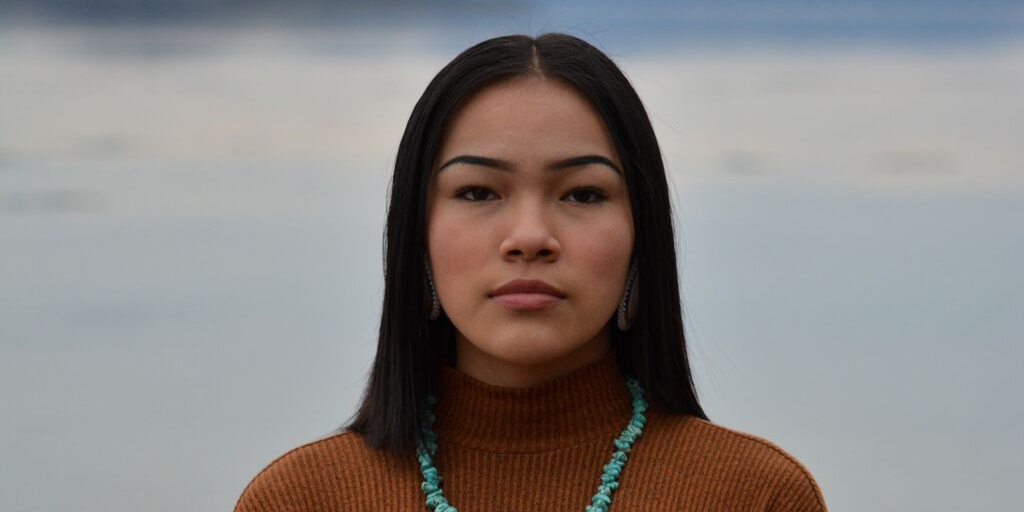Peltier, from Wikwemikong Unceded Territory, spoke at the UN for the second time last month

Greta Thunberg is not the first young person to address the United Nations. A year before Thunberg’s emotional “#HowDareYou” speech made global headlines, Autumn Peltier gave an impassioned address to the United Nations General Assembly for World Water Day, on a stool behind the podium so that she could reach the microphone.
After Thunberg’s speech, photos of Peltier circulated on social media to raise awareness for her work. This year, she’ll return to the UN to speak to the Landscapes Forum. She marched in the Indigenous March with the Global Climate Strike in New York on her 15th birthday.
An article from the CBC detailed her speech and experience at the UN in 2018.
“No one should have to worry if the water is clean or if they will run out of water,” Peltier said in her 2018 speech. “No child should grow up not knowing what clean water is or never know what running water is.”
Peltier is from Wikwemikong Unceded Territory.
“Where I come from I am so fortunate — I can still drink the water from the lake,” Peltier said in her UN address, acknowledging that other communities in Canada still don’t have drinking water. “Our water deserves to be treated as a human with human rights. We need to acknowledge our waters with personhood so we can protect our waters.”
Henk Ovink, the special envoy for international water affairs for the Netherlands called Peltier’s speech inspiring “in our faces as leaders of the world.”
“It’s the young that can help us leap forward, so we have to listen to the young and implement their ideas,” Ovink said.
This past month, Peltier was at the UN again to represent the Anishinabek nation at the Climate Summit. In a Facebook post, her representative wrote that she plans to share an “Indigenous perspective on the Sacredness of Water and why we need to protect this precious gift from Creator and share Traditional knowledge on our relationship with the Land.”
At 15 years old, Peltier already has a long track record of advocating for water issues with values that have been passed down to her.
“If we wait until tomorrow or the next day, the water won’t be the same as that day — in one month or one year, the water gets more and more contaminated.”
Autumn Peltier
Earlier this year, Peltier was named Chief Water Commissioner by the Anishinabek Nation. She is taking on the role from her great aunt, Josephine Mandamin, who recently passed away. Mandamin also advocated for water and trekked the shores of all five Great Lakes to bring attention to issues threatening Canada’s largest natural resource. Her great aunt started doing water walks just before Peltier was born, and would pray for the water while she walked.
“She’s my biggest mentor,” Peliter said in an article for the CBC. “She’s my hero. Every since I was a little girl, she taught me everything I needed to know about the importance of water and becoming a woman. She was one of the most important people to me.”
After visiting a community in Canada under a boiled water advisory when she was eight, she began further researching the issue and advocating for change alongside her elders. Peltier also attended the Children’s Climate Conference in Sweden in 2015 and was nominated for the Children’s International Peace Price in 2017. She’s been nominated again this year. In 2016, Peltier had a tearful encounter with Prime Minister Justin Trudeau. She asked him about pipelines, and he promised to protect the water.
Although the Trudeau Government has cut the amount of Boil Water Advisories on reserves, issues with water quality pervade. Indigenous Services Canada assesses the risk water systems present to their communities with a database called the Integrated Capital Management Systems (ICMS) that. The Globe and Mail conducted an analysis of 11 years of ICMS data and found that the national average risk score across nearly 800 systems has not significantly improved since 2015.
As of August 2019, in B.C. alone, 10 First Nations communities are affected — seven Boil Water Advisories and four Do Not Consume Advisories.
In an article for the Anishinabek News, Peltier previewed the message she brought to the UN summit this year.
“One day, I will be an ancestor and I want to leave a legacy for my great-grandchildren so they know I worked hard to ensure they have a future,” says Peltier. “If we wait until tomorrow or the next day, the water won’t be the same as that day — in one month or one year, the water gets more and more contaminated. Water is the blood of Mother Earth, everything is connected.”
“Nothing can live without water, if we don’t act now there will come a time when we will be fighting for those last barrels of water, once that’s gone we can’t eat or drink money or oil. Then what will you do?”







